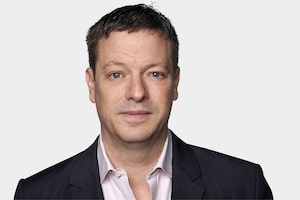
German Chancellor Olaf Scholz receives standing ovations after delivering a speech on the Russian invasion of the Ukraine during a meeting of the German federal parliament, the Bundestag, in Berlin on Feb. 27.HANNIBAL HANSCHKE/Getty Images
Chancellor Olaf Scholz, searching for a way to describe the magnitude of the change he was about to announce, reached for a uniquely German word on Saturday: Zeitenwende, or literally “turning of eras.”
It has been at least 30 years since a German government changed its approach to the world so dramatically – and not since the 1940s has it happened so quickly or suddenly, in response to a single, violent event.
The Russian invasion of Ukraine, Mr. Scholz declared on Saturday when he broke a decades-long ban on arming combatants in wars by directly sending anti-tank weapons, armoured vehicles, ammunition and fuel to the Ukrainian military, “marks a Zeitenwende. It is our duty to do our best to help Ukraine defend against the invading army of Putin.”
That was only the beginning. On Sunday, during a half-hour speech in an emergency session of the Bundestag, Mr. Scholz declared a “180-degree turn” in German military and foreign policy in several major areas.
The baptism of fire of German Chancellor Olaf Scholz
He announced a list of changes. Germany would completely reverse the nonconfrontational, trade-based relationship it has almost continuously held toward Moscow since 1969; use an extraordinary fund of €100-billion to modernize and arm up its military to levels not seen since the peak of the Cold War; raise military spending to more than 2 per cent of its national economy for the first time; quickly retool its energy infrastructure to end its use of Russian gas as its main source of heating; and sidestep its constitutional ban on major government debt to finance these mammoth changes.
“President Putin created a new reality with his invasion of Ukraine,” Mr. Scholz, a Social Democrat, told the legislature. “This new reality requires a clear response.”
In some ways, it reverses a broad policy of non-militarism Germany has embraced, to at least some extent, since the end of the Nazi era in 1945. Germany participated in military actions in the former Yugoslavia and in the Afghanistan conflict after 2002 – but always as a member of a NATO coalition, never unilaterally, and with conditions against direct combat. The new policy seems to end this era.
For all three parties in Mr. Scholz’s government, the policies mark a change.
Mr. Scholz, during the election last year, pledged to base his approach to Mr. Putin on Ostpolitik or “east-looking politics,” the policy initiated in 1969 by Willy Brandt, the first chancellor from Mr. Scholz’s party. It sought to draw the authoritarian countries to the east away from violent or repressive positions through trade and dialogue.
The opposition Christian Democrats came to largely embrace the approach. Angela Merkel, Mr. Scholz’s predecessor, became known as “the Putin whisperer” for her engaged approach to the volatile president.
Mr. Scholz clearly did not want to abandon this policy, but after Mr. Putin’s horrific assault on a European neighbour, the Chancellor was, in the words of Munich columnist Nico Fried, “forced to make history.”
German Chancellor Olaf Scholz addresses an extraordinary session after Russia launched a massive military operation against Ukraine.MICHELE TANTUSSI/Reuters
He began to step away from Ostpolitik on the day of Russia’s invasion, when he announced Germany would halt the mammoth Nord Stream 2 gas pipeline with Moscow. He then agreed to heavy sanctions and, after some hesitation, to the removal of Russia from the SWIFT banking network, before announcing this total change on Sunday.
Many of these changes have been promoted over the past several months by his more hawkish Foreign Minister, Green Party chief Annalena Baerbock. Her influence is not unprecedented. The last time Social Democrats and Greens governed together, from 1998 to 2005, it was another Green foreign minister who led the charge for Germany to participate in a war for the first time since 1945, as part of the NATO coalition to stop Serbian atrocities in Kosovo.
But the new policies also mark a shift for her Greens. As part of the shock move to decouple Germany from Russian gas supplies, the coalition agreed to increase Germany’s coal and natural-gas reserves and to build new liquefied-natural-gas terminals to bring fuel from overseas – both seen as necessary solutions despite their high emissions. Germany will also spend more on alternative energy.
For the third party in the coalition, the libertarian-leaning Free Democrats, the huge, debt-financed expenditure must have been hard to swallow. But their party’s leader, Finance Minister Christian Lindner, appears to have embraced the new reality. Using left-leaning language, he referred to the €100-billion expenditure as “not a debt, but an investment in our future.”
And, to describe the expenditure on alternative energy, Mr. Lindner coined another obscure German word: Freiheitsenergien, or “freedom energy” – that is, energy from countries that can’t blackmail Germany, that, he said, “frees us from dependencies.”
The new word provided a good summary of the extraordinary day in Berlin: A sudden, historic blast of freedom energy.
Our Morning Update and Evening Update newsletters are written by Globe editors, giving you a concise summary of the day’s most important headlines. Sign up today.
 Doug Saunders
Doug Saunders